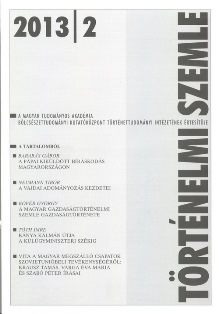A vajdai adományozás kezdetei
The Beginnings of the Voevode of Transylvania’s Right of Donation
Author(s): Tibor NeumannSubject(s): History
Published by: Magyar Tudományos Akadémia Bölcsészettudományi Kutatóközpont Történettudományi Intézet
Summary/Abstract: The instruction given by Ferdinand I (1526–1564) to András Bátori, voevode of Transylvania, in 1552, by which the king authorised the voevode to grant away freely the smaller estates (that is, within 20 tenant sessions) which devolved upon the Crown in Transylvania, has long been known and cited in the historiography. What is still unknown is since when the voevodes had enjoyed such an authority. According to the author, the first voevode to acquire the royal right to make landed donations was János Szapolyai (1510–1526), later king of Hungary as John I (1526–1540). He seems to have been given the right as a compensation after the spring of 1519, when, upon the death of Imre Perényi, István Bátori, ispán of Temes was elected as palatine instead of János Szapolyai himself. The limit of his donational authority was initially 400 tenant sessions, but it seems to have been curtailed shortly thereafter, for already in 1521 and 1523 the voevode only made donations which extended to much smaller estates (the study offers a detailed analysis of the not too many surviving sources). It has to be emphasised, however, that the donational authority of the voevode was not an organic outgrowth of Transylvanian constitutional development, but was tailored instead to the person of the richest Hungarian magnate, voevode János Szapolyai, and thus further contributed to the emerging princely „aura” which surrounded the voevode, anyway of royal blood on his mother’s side. Since so far no donation of land made by any of the voevodes in the period between 1526 and 1552 has come to light, it is open to doubt whether during the wording of the 1552 instruction the right once granted to Szapolyai was used as a precedent. It is thus possible that it is in fact the donational right enjoyed by the royal commissionaries – among them the captain-general András Bátori –, who were sent by king Ferdinand to Transylvania in 1551, and the experience gained from their activity there, which should account for the subsequent authority granted to Bátori himself. It is certain that not only he but also his successors, Ferenc Kendi and István Dobó, exerted the right of donation.
Journal: Történelmi Szemle
- Issue Year: 2013
- Issue No: 02
- Page Range: 261-269
- Page Count: 9
- Language: Hungarian

